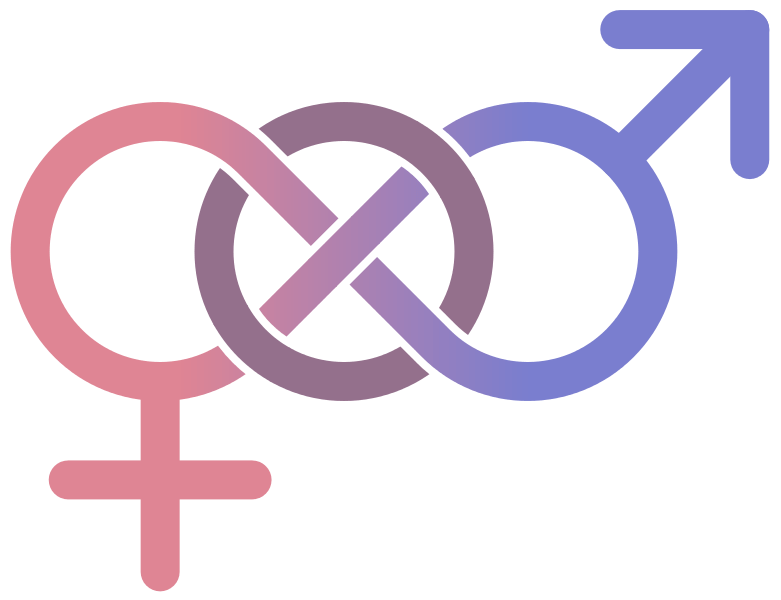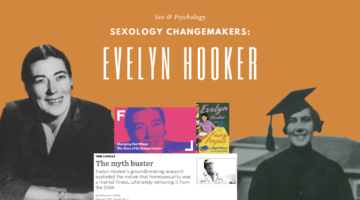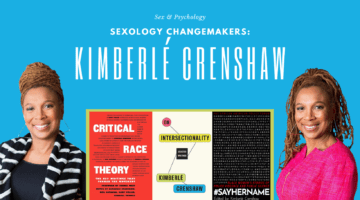Why Affirming Bisexual and Pansexual Identities is Important
November 2, 2022 by Olivia Adams
“I’m not even sure bisexuality exists. I think it’s just a layover on the way to Gaytown.”
“You know, I think it’s great. He’s open to all sexual experiences. He’s evolved. It’s hot.”
“It’s not hot, it’s greedy! He’s double dipping.”
Over twenty years ago, Sex in the City dipped a toe into the roiling discussion surrounding bisexuality, and some might say it did not age well. In a three-minute scene from season 3, the show invokes almost every bisexual stereotype, and even the few (lukewarm) attempts at questioning those stereotypes are met with normative logics of greed, binaries, and resentment.
It’s clear that LGBTQ+ people in general contend with heterosexism—discrimination that places heterosexual relationships above other types of romantic and/or sexual relationships—in the workplace, online, within the home, and on the street. In recent years, more attention has been paid to the phenomenon of monosexism, a particular kind of sexual discrimination that posits attraction to one gender as superior to or more legitimate than attraction to more than one gender. Terms like “bi-erasure,” referring to the silencing of bisexual experiences or voices in favor of a binary sexuality system, or even debates surrounding the relative inclusivity of “bisexuality” versus “pansexuality” are also wrapped up in the broader context of monosexism.
Unfortunately, the Sex in the City take on bisexuality isn’t all that dated. In 2020, Carlton and Diamond’s breakup over this issue in the reality show Love Is Blind sparked debates over bisexual people’s obligation to reveal their sexual history once again. And the scientific research confirms these biases—bisexual people routinely experience sexuality-related discrimination from both heterosexual and lesbian and gay communities. This discrimination is also tied to negative mental health outcomes. Additionally, a study related to nuances in discrimination by gender suggest that bisexual men may face more discrimination than bisexual women due to heterosexual norms that accept sexuality fluidity among women more than the same fluidity among men. In terms of general attitudes among American adults towards lesbian, gay, and bisexual people, we see further nuance—while attitudes towards gay and lesbian people have shifted from negative to positive in recent years, that change has only moved from negative to neutral for bisexual people.
Most of the research on monosexism focuses on bisexual people in the U.S. and other Western nations. However, a new study in The Journal of Sex Research is expanding this work outside Western contexts and explores the interactions between gender, monosexism, heterosexism, and sexual identity integration in Hong Kong.
In this study, researchers surveyed 314 cisgender adults aged 16 or older who also lived in Hong Kong and identified as either bisexual or pansexual. The participants were asked about their experiences of heterosexist and monosexist discrimination as well as depression and anxiety symptoms. Participants also answered questions about their level of sexual identity integration, or to what degree their sexual identity was enmeshed in their overall sense of self. The researchers measured this concept in three ways: how negatively they felt about their own sexual identity, how comfortable they felt about their sexual identity, and how “out” they were in various social settings.
Because previous research consistently links negative mental health outcomes for bisexual people experiencing monosexist discrimination, the researchers hypothesized that monosexism would be more strongly associated with poor mental health outcomes when compared to heterosexism for plurisexual people in Hong Kong as well. Previous work also suggests that bisexual men face greater pressure to conform to monosexist standards than women—the researchers suspected similar pressures in Chinese social contexts, so they also also predicted that bisexual and pansexual men would have worse outcomes than women. Finally, the researchers turned to the minority stress model to support their third hypothesis. This model suggests that people with minoritized identities experience considerable social stress and that for LGBTQ people, having a positive stance towards one’s sexual identity might protect against discrimination-related stressors. Building from this, the researchers expected that participants with a positive relationship to their own plurisexuality would have better mental health outcomes. They were mostly right!
For all participants, experiences with monosexism predicted higher levels of anxiety and depression more robustly than heterosexism. In other words, for bisexual and pansexual Hong Kong residents, discrimination about their plurisexuality (defined as sexual and/or romantic attraction to more than one gender) was worse for their mental health than discrimination about their non-heterosexuality—the association between monosexism and depression was also stronger for men. On a positive note, participants who embraced their sexual identities more strongly had significantly lower monosexism-related anxiety and depression.
These findings are similar to other studies focused on monosexism in Western countries. However, the study authors note at least one important cultural difference to help interpret the findings from these studies. While it is unsurprising that men had worse mental health outcomes in terms of depression in light of other research finding greater discrimination against bisexual men than women, this gender difference might also be due to cultural expectations stemming from Confucianism. According to the study authors, Chinese men face “heteronormative family pressure” to “get married and have children due to the patrilineal structure of the Chinese family unit,” a social expectation that may help explain the increased depression among plurisexual male participants.
Monosexism is not a new problem faced by bisexual, pansexual, and other plurisexual people and continues to be a hot button issue in popular culture. Research tells us that this kind of discrimination has important negative implications for people targeted by it; however, it also suggests how to combat it. Supporting people with plurisexual identities and affirming the legitimacy of their identities is one step towards reducing monosexist bias.
This post was written by Olivia Adams, Co-Managing Editor of Sex and Psychology. Learn more about Olivia here.
Want to learn more about Sex and Psychology? Click here for more from the blog or here to listen to the podcast. Follow Sex and Psychology on Facebook, Twitter (@JustinLehmiller), or Reddit to receive updates. You can also follow Dr. Lehmiller on YouTube and Instagram.
To learn more about this research, see: Chan, R. C. H., & Sin Yu Leung, J. (2022). Monosexism as an Additional Dimension of Minority Stress Affecting Mental Health among Bisexual and Pansexual Individuals in Hong Kong: The Role of Gender and Sexual Identity Integration. Journal of Sex Research, 1–14. https://doi.org/10.1080/00224499.2022.2119546
Additional References
Dodge, B., Herbenick, D., Friedman, M. R., Schick, V., Fu, T. C., Bostwick, W., Bartelt, E., Muñoz-Laboy, M., Pletta, D., Reece, M., & Sandfort, T. G. M. (2016). Attitudes toward Bisexual Men and Women among a Nationally Representative Probability Sample of Adults in the United States. PLOS ONE, 11(10), e0164430. https://doi.org/10.1371/JOURNAL.PONE.0164430
Roberts, T., Horne, S. G., & Hoyt, W. T. (2015). Between a Gay and a Straight Place: Bisexual Individuals’ Experiences with Monosexism. Journal of Bisexuality, 15(4), 554–569. https://doi.org/10.1080/15299716.2015.1111183
Ross, L. E., Salway, T., Tarasoff, L. A., MacKay, J. M., Hawkins, B. W., & Fehr, C. P. (2017). Prevalence of Depression and Anxiety Among Bisexual People Compared to Gay, Lesbian, and Heterosexual Individuals: A Systematic Review and Meta-Analysis. The Journal of Sex Research, 55(4–5), 435–456. https://doi.org/10.1080/00224499.2017.1387755

Dr. Justin Lehmiller
Founder & Owner of Sex and PsychologyDr. Justin Lehmiller is a social psychologist and Research Fellow at The Kinsey Institute. He runs the Sex and Psychology blog and podcast and is author of the popular book Tell Me What You Want. Dr. Lehmiller is an award-winning educator, and a prolific researcher who has published more than 50 academic works.
Read full bio >


